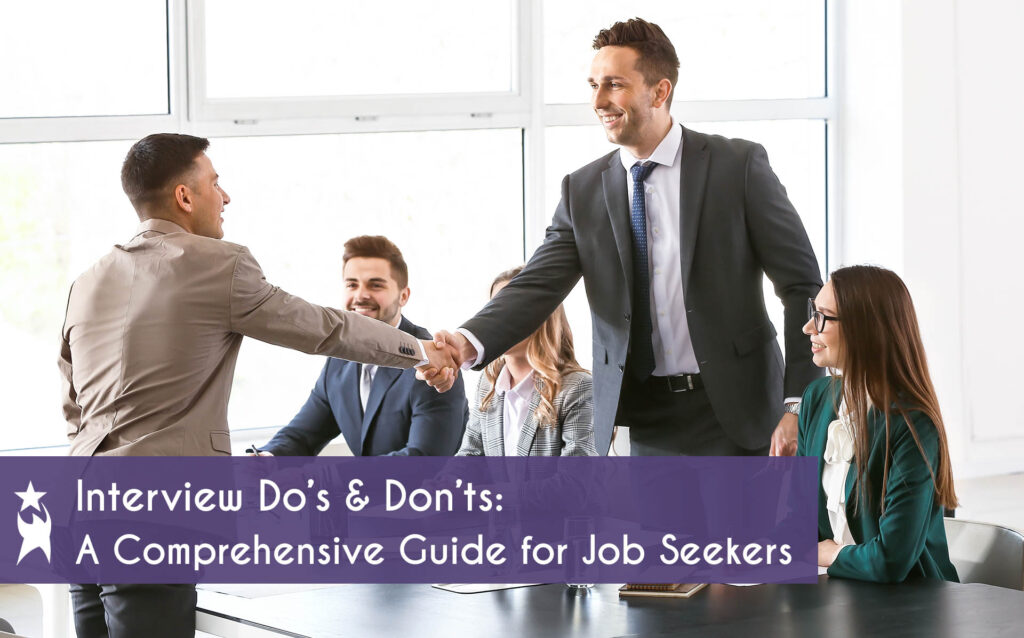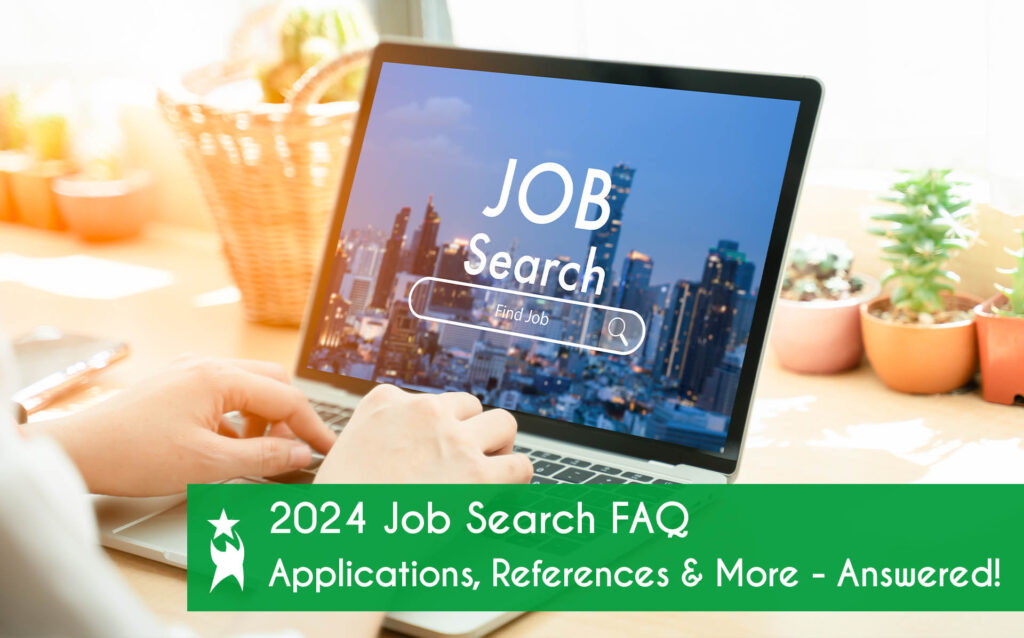Job interviews can be nerve-wracking, but they’re also your gateway to new career opportunities. Whether you’re starting fresh or aiming to advance, knowing the key do’s and don’ts can help you make a lasting, positive impression.
Before the Big Interview
Congrats on landing an interview! Preparation is the foundation of a strong interview. Take these steps to boost your confidence and performance.
Do
Research the company and role: Understand the company’s mission, values, and goals so you can tailor your responses.
Practice answers to common interview questions: Use the STAR method (Situation, Task, Action, Result) to structure answers about your strengths and accomplishments.
Schedule a mock interview: Practice with a friend or recruiter to refine your delivery and get feedback.

Don't
Wing it: A lack of preparation will show. Study the company and the job to stand out.
Memorize generic answers: Authenticity matters—share unique examples that reflect your skills and experience.
Be late: Plan your route and leave extra time to ensure punctuality.
Ask Smart Questions
Asking thoughtful questions shows your interest and helps you learn more about the role and company.
Do Ask About
Company culture and teamwork: Learn about collaboration, core values, and how teams operate for insight about whether or not you’re a good match.
Role expectations: Clarify responsibilities, key projects, and opportunities for growth.
Challenges and goals: Show initiative by asking about upcoming challenges or areas where you could contribute.
The interviewer’s experience: Ask about their experiences with the company for insights about company culture.
Don't Ask About
Salary or benefits upfront: Keep the focus on your skills and fit first.
Basic info you could find online: Research the company beforehand to avoid wasting time.

Personal questions: Stick to professional topics.
Bonus Interview Questions
Consider asking thoughtful questions about:
Diversity and Inclusion
- Can you describe the company’s commitment to diversity and inclusion?
- What specific initiatives or programs does the company have in place to promote a diverse and inclusive workplace?
- How does the company measure and track progress towards its diversity and inclusion goals?
- Can you share an example of how the company has addressed a challenge related to diversity and inclusion?
- What opportunities are there for employees to get involved in diversity and inclusion initiatives?
Company Culture
- How would you describe the company culture?
- What are some of the company’s core values, and how are they reflected in daily work?
- What opportunities are there for professional development and growth within the company?
- How does the company encourage collaboration and teamwork?
- What are some of the company’s social activities and events?
Negative aspects of the company or competitors: Asking about rumors, gossip, or internal problems portrays negativity and raises red flags. Instead, focus on what excites you about the company and potential challenges you’d be interested in tackling.
Anything inappropriate or discriminatory: Avoid jokes, offensive language, or questions that touch on sensitive topics like race, religion, or politics.
Dress to Impress
Your outfit sets the tone for your first impression. Dress appropriately for the role and company culture. Whether you’re aiming for a light industrial or office position, follow these do’s and don’ts to land the job with a confident and polished look.

Do
Keep it clean and polished: Choose outfits without wrinkles, stains, or visible wear. Invest in pieces that fit well and look good on you.
Match the workplace: Research whether the dress code is formal or casual and adjust accordingly.
Pay attention to details: Shoes, accessories, and grooming matter just as much as your outfit.
Feel confident and comfortable: Wear something that boosts your confidence and lets you move and talk comfortably during the interview.
Don't
Underdress or overdress: Aim for a balance between professional and appropriate for the job.
Clash with the company culture: Research the company beforehand and dress accordingly. If unsure, err on the side of a slightly more formal outfit.
Wear distracting styles: Avoid anything too trendy, revealing, or heavily scented.
Neglect preparation: Have a backup shirt or blouse ready in case of accidents
Bonus Interview Dress Tips
Pack a backup: Accidents happen! Bring a spare shirt or blouse just in case.
Be comfortable: You shouldn’t be fidgeting or feeling restricted. Choose clothes that let you move and breathe easily.
Keep it simple: Avoid heavy perfumes, loud jewelry, or anything distracting.
Feeling confident and ready in your outfit can amp up your interview game and highlight your professionalism. Remember, though, your outfit is just a piece of your personal brand. Combine it with positive body language, a genuine smile, and a strong handshake to make a lasting impression.
During the Interview
You’ve prepped, you’re confident, and you’re ready to show them what you’re all about. This is your moment to shine. Show enthusiasm, professionalism, and confidence.
Do
Greet everyone warmly: Start with eye contact, a smile, and a firm handshake.
Listen actively: Focus on the interviewer’s questions and respond thoughtfully.
Share achievements: Highlight successes with specific examples and measurable results.
Ask clarifying questions: If you’re unsure about something, it’s okay to ask.
Express enthusiasm: Demonstrate real interest in the role and the company’s mission.

Don't
Slouch or fidget: Maintain good posture and a professional demeanor.
Speak negatively about past employers: Keep the focus on your growth and positive experiences.
Dominate the conversation: Strike a balance between talking and listening.
Complain about salary or benefits: Wait until later stages to talk compensation.
Use unprofessional language: Avoid profanity, slang, jargon, and filler words like “um” or “like.”

After the Interview
The interview may be over, but your journey toward securing a job offer is far from complete. This section walks you through what you can do after the interview to improve your chances of landing the job.
Thank You Notes
Your mission to make a lasting impression shouldn’t end when you exit the interview room. To ensure your impact lingers, sending a thank-you note within 24 hours is key. While email is convenient, a handwritten note can truly stand out.
Do
Express Genuine Gratitude: Begin your thank-you note by sincerely expressing your gratitude for the interviewer’s time and the opportunity provided.
Reiterate Your Interest: Reaffirm your interest in the position and the company. Let them know that the interview has strengthened your enthusiasm for the role.
Highlight Key Qualifications: Briefly mention key qualifications or experiences that align with the requirements discussed during the interview. Remind them of your value.
Proofread Carefully: Before sending, carefully proofread your note to ensure there are no grammatical errors or typos. A polished thank-you note reflects attention to detail.
Respectful Tone: Maintain a respectful and professional tone throughout the note. Avoid overly casual language and make sure your tone is professional.
Don't
Avoid Generic Content: Avoid clichés or generic phrases that might sound insincere. Write a unique and thoughtful message that reflects your genuine appreciation.

Procrastinate: Send your thank-you note promptly, ideally within 24 hours of the interview. Delaying the note might diminish its impact.
Avoid Lengthy Details: While it’s essential to express your gratitude, avoid lengthy details that could make the note seem too long. Keep it concise and focused.
Sound Desperate: While expressing interest, avoid sounding desperate for the job. Maintain a balance between enthusiasm and professionalism.
Bonus Gratitude Tip
For an extra edge, personalize your note with details from the interview and offer to answer any questions. This thoughtful gesture highlights your professionalism and commitment, leaving a lasting positive impression that can boost your chances of landing the job.
Avoid Mentioning Salary: Refrain from talking about salary or benefits in the thank-you note. Focus on your fit for the role and the company’s mission.
Follow Up After an Interview
While an interview marks the end of your active participation, showing continued interest is key. Following up demonstrates professionalism and keeps your candidacy fresh in the interviewer’s mind. However, timing is crucial. Wait at least a week before reaching out, respecting the interviewer’s time to assess all candidates. If they mentioned a specific decision timeline, adhere to that.
Do
Send a note within 24 hours: A timely email or handwritten note shows gratitude and professionalism.
Reiterate your interest: Mention what excites you about the role and company.
Highlight key points: Briefly remind the interviewer of your skills and qualifications.
Be professional: It’s ok to request information on when you can expect to hear back about the next steps in the hiring process but keep it concise, professional and respectful.
Don't
Procrastinate: A delayed note can lose its impact.
Be pushy: Avoid excessive follow-ups. Sending multiple emails in a short period may be perceived as pushy and can have a negative impact.
Sound Desperate: Steer clear of sounding desperate for a response. Keep your follow-up message professional and composed.
Be generic: Avoid cookie-cutter messages. Make your note personal and sincere.

Make Assumptions: Don’t assume the worst if you haven’t heard back right away. Decisions often take time, and jumping to conclusions can cause unnecessary stress.
Remember, a well-crafted follow up email demonstrates your continued interest and professionalism, increasing your chances of staying on the employer’s radar for consideration.

Reflect on Your Interview Performance
While the interview itself is over, your journey shouldn’t end there! Self-reflection is crucial for future success. Take some time to analyze your performance. Did you communicate effectively? Highlight your strengths? Use this time to identify areas for improvement, like stumbling on specific questions or forgetting key accomplishments. Be honest and embrace growth opportunities. Follow these do’s & don’ts to get the most out of the process.
Do
Check Yourself: Take a moment to think about how you did. Be honest about how well you spoke about your skills and why you’re a good fit.
Think About How You Acted: Reflect on how you acted without words, including your body language and expressions. Consider how these things played a part in how the interviewer saw you.
Spot Your Strengths: Notice the things you did well during the interview. Give yourself credit for moments where you showed you’re the right person for the job.
See Where You Can Get Better: Figure out where you can do better next time. Think about times when you could have answered questions more clearly or made a stronger impact.
Ask for Feedback: If you’re working with a recruiter, ask them for feedback after your interview! They can follow up directly with your interviewer and find out exactly how you did. This feedback can help you see how you did from a hiring manager’s perspective and provide expert tips for improvement.
Don't
Be Too Hard on Yourself: Don’t beat yourself up! While it’s good to think about how you could improve, don’t let it make you doubt yourself.
Ignore the Good Stuff: Don’t forget about the good parts of the interview. Acknowledge and build on moments where you showed you’re a great fit for the job.
Forget to Make a Plan for Improvement: Reflection on how you did in the interview isn’t valuable without a plan. Figure out specific things you can do to improve for next time.
Speed Through the Process: Don’t rush through thinking about your performance. Take the time you need to really think about how you did, both with your words and how you carried yourself.
By turning each interview into a learning experience, you’ll build confidence and refine your skills, making you a stronger candidate for your dream job. Remember, landing a job takes patience, preparation, confidence, and a genuine connection with your interviewer. By following these dos and don’ts, you’ll be well on your way to acing your next interview and advancing in your career!
Bonus Interview Success Tips
Be mindful of your digital footprint: Ensure your social media profiles are professional and reflect the image you want to project.
Network authentically: Build relationships with professionals in your field, as connections can open doors to new opportunities.
Embrace continuous learning: Stay updated on industry trends and develop new skills to enhance your marketability.
Celebrate your successes and learn from your setbacks: Every interview is a learning experience. Keep a positive attitude and focus on growth.
Got questions about your career? We’re always happy to answer questions from our readers, so send them our way!
Check out our other blog posts for more useful tips!
Resources
- Throwing Flags: Interview Mistakes That Could Cost You the Job
- Seal the Deal: Turn That Successful Interview into a Job Offer
- From Hanger to Hired: Dress for Success to Land the Job
- Telling Tales: Using Storytelling to Land the Job You Want
- WOW Your Interviewer With These Next-Level Nonverbal Communication Tips







